An Overview of Choral Activities in Malaysia
Susanna Saw, Director and Founder of The Young Choral Academy, Kuala Lumpur
The choral scene in Malaysia is very much in its infancy. There is still much to be done to bring it up to the standard of international choirs, but before this is addressed one needs to understand the history of Malaysia’s choral tradition.
The birth of choral singing can be traced back to Malaysia’s pre-independence in 1957, when the British established many missionary schools here. Choral singing was introduced as part of the curriculum in some of these schools. During the 1940s and 50s, much of the culture of the Malaysian Chinese community was heavily influenced by the culture in China. After hearing a visiting choir from Wuhan, many of the local Chinese associations started forming choirs for their own members. The three choirs which were established during this time are Chin Woo Athletic Association Selangor and KL Choir, the Selangor Yan Keng Benevolent Dramatic Association Choir, and the Qiong Lian Operatic Association Choir. These choirs are still active today with choir members ranging from 20 to 70 years old! Following this, from the 1960s onwards many other associations began forming their own choirs.
All these choirs played, and continue to play, an important role in nurturing choral singing activities in Malaysia. Over the years, they have organised events such as music festivals, competitions, and concerts in order to keep this singing culture alive. Even though these activities have been historically focused more on the Chinese choir community, they paved the way for the establishment of the existing choral scene and are still very much an important part of Malaysia’s choral culture as a whole.
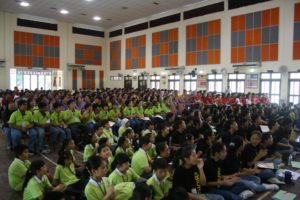
Compared to our neighbouring countries like Singapore and Indonesia however, Malaysia’s awareness of choral education still needs some encouragement. To the public, the term ‘choir’ merely refers to another form of entertainment. In schools, singing in a choir is only an extracurricular activity and is usually the first to be eliminated when exams are approaching, or if students face any academic difficulty.
Although music is a compulsory subject at primary schools, there is not much focus or structure on choral singing. Choirs exist in most schools for the main purpose of performing for school occasions such as Speech Day, National Day and Teachers’ Day. Schools with better funding may employ professional vocal instructors to work with the choir members; however, this is the exception rather than the rule due to funding constraints.
‘Show Choir’ is the preferred choral style in Malaysia. The public here has the general idea that choral singing requires singers to be inanimate and it is therefore less commercially entertaining. The public thus appears to respond better to flashy showmanship rather than the beautiful sound of harmonious voices. Consequently, more and more choirs in Malaysia are working towards singing with movement or choreography.
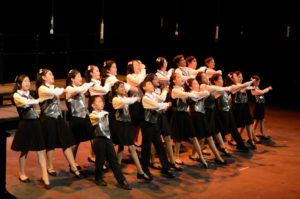
The annual Inter-School Choir Competition among public schools in Malaysia plays an important role in promoting the choral singing culture. Malaysians by nature are very competitive. This is the only way to motivate the members to attend extra rehearsals and to strive for quality. This is also a way of obtaining funding and support from school principals, teachers and parents. As the majority of participating schools focus only on competitions, choir activities will sadly diminish after the competition season ends. Only schools that are very keen on choral singing, or which have good music teachers, will continue their rehearsals post-competition.
With the above understanding of the Malaysian choral history and activities in mind, there are three crucial areas which need to be addressed at the present moment with a view towards long-term investment:
- Teachers’ Training
In order to improve music awareness and to raise the standard of music in Malaysia, good music teachers are a necessity. In Zoltan Kodaly’s words (Choksy, 1999):
“For a poor director fails once, but a poor teacher keeps on failing for thirty years, killing the love of music in thirty generations of children.”
In recent years, younger musicians in Malaysia have slowly become aware that there are indeed good prospects in becoming a choir teacher. Through their participation in overseas competitions and music festivals, some have started to pursue choral conducting in earnest. With the experience and exposure gained from abroad, they have started working with secondary level school choirs (aged 13-19) and independent youth and adult choirs. The level of singing within this age group has seen tremendous improvement: mixed voice choirs have proved to be very popular on the local scene, and marked developments have also emerged in several equal voice choirs.
In contrast with the secondary school choirs, the standard of primary school choirs is still very much wanting. Most of the experienced choir teachers prefer working with young people to working with younger children, mainly because they feel that they lack the experience or the patience, and thus it would be easier to share their musical knowledge with older members. On top of that, the younger teachers may not have had much experience, if any, in classroom management.
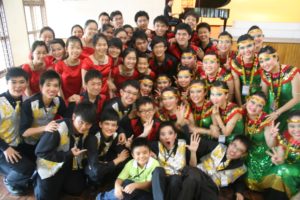
In addition, training in childhood music education needs to be further developed. In recent years, courses in Teacher Training have been brought to Malaysia from abroad to give teachers an avenue for mastering their teaching skills, without the considerable expense of international travel. The Kodaly Method courses focusing on Early Childhood and Primary Level training have been conducted here annually since 2009. More recently, in 2010, training courses for the Orff Approach were organised locally. These programs help teachers to plan lessons and widen their knowledge in obtaining teaching resources. They are also able to work on their musicianship skills, expand their musical repertoire and develop proper skills in conducting and methodology. Most importantly, they have the chance to form a Teachers’ Support Group, making it possible to share knowledge with one another.
- Repertoire and Publication
Malaysia has a rich musical heritage. The three major races in Malaysia – Malay, Chinese, and Indian – each have their own musical culture. The eastern part of Malaysia consists of two large states – Sabah and Sarawak. The communities from these two states also have their unique forms of music drawn from the numerous ethnic tribes which make up the population. Each of these cultures has inadvertently left its own mark in the melting pot of music that identifies Malaysia.
However, there is no one body of music in existence which brings together or promotes Malaysian music. The younger generation is very much pop-influenced; Chinese communities still sing songs ‘imported’ from China, and we seldom hear choirs perform Indian music. Malaysian choirs participating in international level competitions often find it very difficult to locate music which represents our culture. Arrangements by our local composers and arrangers are scant and unfortunately for the most part, our choirs have to resort to singing Malaysian folk choral works arranged by composers from Singapore, the Philippines and other countries.
To address this, the Young Choral Academy in Kuala Lumpur has, since 2007, taken up the role of compiling and promoting Malaysian compositions and arrangements, publishing a series of works by Malaysian composers. The Academy regularly commissions work from these composers, and encourages budding composers to produce more choral works to cater to the needs of local choir teachers at all levels.
Apart from publishing, the Young Choral Academy also promotes local music by producing and performing shows that feature Malaysian music. “Buatan Malaysia” (Made in Malaysia), for example, is an annual concert which provides a platform not only for the public to learn more about Malaysian music, but also for composers to showcase their works whilst encouraging choirs to sing them. It is our hope that the Academy’s efforts will sow the seeds of public appreciation for Malaysian music which will bear fruit in the near future.
This year, the Young Choral Academy, together with some Malaysian composers, will be organising the first ever workshop for composers on choral music composition. This workshop will specifically focus on introducing knowledge of the vocal arts to the participants by bringing in experienced choral composers from the neighbouring countries, vocal instructors, singers and choirs to work with them during the event.
- Festivals and Competitions
We have seen an increase in workshops and competitions being held in Malaysia over the last few years. On many occasions, choral clinicians have been brought in from abroad to help raise awareness and the standard of choral singing. Among the larger choral events held here are the Selangor/Kuala Lumpur Music Festival (held annually since the 1960s); the Klang Music Festival (since the 1980s); the Penang State Symphony Orchestra and Chorus Camp (since 1990), and the Malaysian Choral Eisteddfod (since 2003; formerly known as the Young Singers Choral Festival).
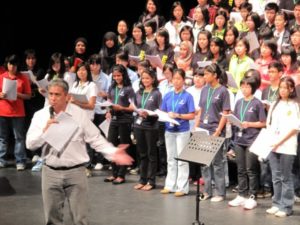
The increased participation of choirs in these events is truly an encouraging indication that people are beginning to take a serious interest in Malaysian choral singing, and we hope to continue to make progress and uphold the standards of these events.
Of course, there are many other areas for us to improve upon, such as building better halls with good acoustics for voice, forming a Choral Directors Association, obtaining better financial and media support including support from the government and the public. The list goes on and on! There is never an end to the improvements that can be made. The journey towards building a better choral culture is always tough, yet it is equally exciting to see its progress. It is not the effort of one, but the contribution of many that has made, and will make, this progress become reality. It is my sincere hope that Malaysian choirs will make a significant impression on the world choral map in the near future.
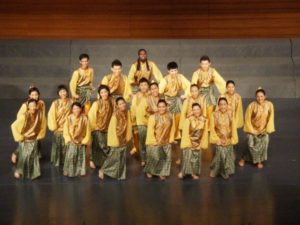
Events in 2011
- 9th Malaysian Choral Eisteddfod – May – June
2011 will see the Malaysian Choral Eisteddfod reaching out to more singers through its “Outreach Programme”. This event will be held in different states:
29th April – 1st May: Kuching , Sarawak
6th – 8th May: Kota Kinabalu, Sabah
28th and 29th May: Selangor/Kuala Lumpur – Children’s Category
11th – 13th June: Selangor/Kuala Lumpur – Youth Category
18th – 20th June: Ipoh, Perak
- Kodaly Early Childhood Training – 30th May – 10th June
- Klang Music Festival – 27th -28th August
- 1st Malaysian Choral Composers Workshop – September
- Kuala Lumpur/ Selangor Music Festival – Third weekend in November
- Kodaly Primary Level Training – 5th – 16th December
- Celebrating World Choir Day – 11th December
Edited by Gillian Forlivesi Heywood, Italy